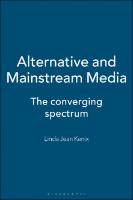Alternative and Mainstream Media
The converging spectrum
Abstract
This book is available as open access through the Bloomsbury Open Access programme and is available on www.bloomsburycollections.com. Historically, alternative media have been viewed as fundamental, albeit at times culturally peripheral, forces in social change. In this book, however, Kenix argues that these media do not uniformly subvert the hierarchies of access that are so central to mainstream media - in fact, their journalistic norms and routines have always been based on the professional standards of the mainstream. Kenix goes on to posit the perception of 'mainstream' and 'alternative' as a misconception. She argues that, although alternative media can - and do - construct distinct alternative communications, they have always existed on the same continuum as the mainstream and the two will continue to converge. Through comparative analysis, this book argues that many alternative and mainstream media are merging to create a continuous spectrum rooted in commercial ideology. Indeed, much of what is now considered alternative media actually draws very little from principles of the independent press, whereas many contemporary mainstream media now use communication techniques more commonly associated with media that do not operate for financial gain. This book puts forward a controversial but convincing argument around the relationship between alternative and mainstream media, drawing on examples from the UK, US, Australia and New Zealand to strengthen and develop the central premise.
Keywords
Media studiesDOI
10.5040/9781849665421ISBN
9781849665438, 9781849665414, 9781849665438Publisher
Bloomsbury AcademicPublisher website
https://www.bloomsbury.com/academic/Publication date and place
London, 2011Imprint
Bloomsbury AcademicClassification
Media, entertainment, information and communication industries
News media and journalism


 Download
Download